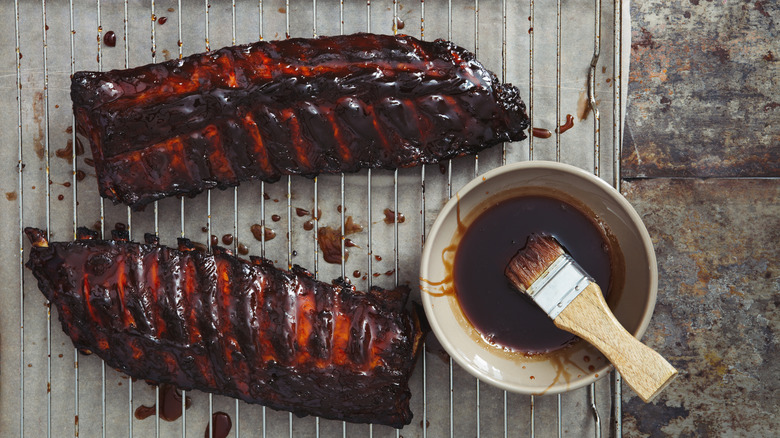Not Every BBQ Sauce Is Tomato-Based. Here's What You Can Use Instead
While tomato products may be your first thought when making barbecue sauce, there are other options that you should consider. According to Jim Giberson, co-founder and head chef for Tamarind Heads, tamarind is one of the best options. "It offers a naturally complex balance of sourness, subtle sweetness, and deep umami that tomato simply can't match," Giberson said. "It's a more expressive, versatile base that lets the sauce evolve with the dish." He added that while tomato-based sauces can overpower meat, tamarind-based ones don't. "They enhance rather than mask, offering a sour-sweet complexity that plays beautifully with smoke, char, and spice."
If you want other options, he said mustard, which is the base for South Carolina barbecue sauce, "[brings] a zesty, peppery bite that cuts through fattier meats." Vinegar-based ones, on the other hand, brighten up the dish, which makes them perfect for rich cuts, such as brisket or pork shoulder. White sauces — like an Alabama white sauce – "typically built on mayonnaise, offer a creamy tang that cools and contrasts smoky flavors." These alternatives allow for more nuance and regional expression, and they give the meat room to speak for itself.
If you want a unique sauce, Giberson mentioned using a fruit base — like mango or cherry — to bring seasonal flavor. You can also include other ingredients to round everything out. For example, harissa gives a spicy kick to just about any recipe. "Molasses or brown sugar can deepen the flavor and add richness, while spices like cumin and black pepper provide structure and warmth," Giberson said.
The best meat pairings for various barbecue sauces
When it comes to pairing your barbecue sauce with meat, there's definitely some strategy you should employ. For sweet yet tart tamarind-based sauces, Jim Giberson suggested options like chicken thighs, pork ribs, and flat iron steak. "The sour-sweet-spicy depth of our tamarind sauce complements the char and smoke from grilling, while its acidity helps tender cuts stay vibrant," Giberson explained. If you're going with a mustard-based sauce, he noted that those work really well with meats like pulled pork, smoked sauces, and pork belly, "where their tangy heat balances the richness."
Vinegar-based sauces are ideal for whole hog, brisket, and pork shoulder, because they "[offer] a clean counterpoint to fatty textures." White sauces, on the other hand, work beautifully with smoked meats, like chicken or turkey, or grilled fish. He mentioned this is because the mayo helps to cool down the charred flavors. If you're opting for a fruit-based sauce, he recommended pairing it with something fresh off the grill, like shrimp, pork chops, or chicken wings. He noted that the "sweetness and aroma [will] elevate the natural flavors of the meat."
All in all, Giberson loves the opportunity to use bases for barbecue sauce that stray from mainstream tomatoes. "These alternatives allow for more nuance and regional expression, and they give the meat room to speak for itself."


